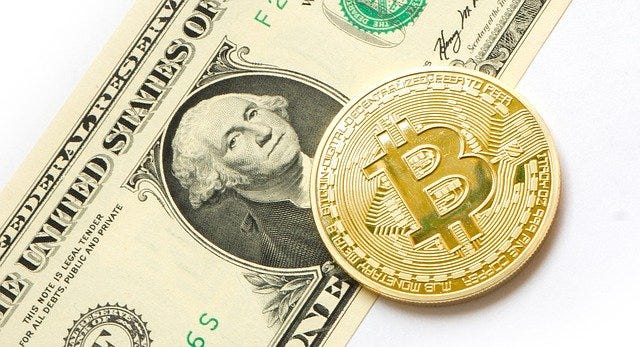Is Crypto Really Ready For Its Closeup?
Bitcoin and its chums are on fire right now. But that doesn't guarantee the problems have been solved.
Hi from James Ledbetter, former editor-in-chief of Inc. magazine and author/editor of six books. Thanks for reading FIN, the best weekly newsletter about all things fintech. Please forward this to anyone you think would appreciate it!
Number of the Week: 14 (explanation below)
Is Crypto Really Ready For Its Closeup?
For the last few weeks it has felt like cryptocurrency is everywhere you look. Last month Square announced that it had invested 1% of its assets, or around $50 million, in Bitcoin. This week, Bitcoin traded at more than $16,000 for the first time in two years. The contracting/payroll startup Deel rolled out a system this week that allows employees to withdraw their paychecks in the cryptocurrency of their choice. PayPal just enabled all U.S. customers to send and receive money in various cryptocurrencies, and plans to make this service available in other markets in 2021. And perhaps most strikingly, a recent report from the Bank of International Settlements noted that more than 80% of central banks surveyed are working on some form of digital currency.
The benefits of central bank digital currencies (CBDC) seem clear and China, moved to act by Bitcoin’s growth, is already testing a digital currency in at least four cities, according to my former colleague Clay Chandler. Still, there is a lot of hype and froth around this topic, overlooking some significant hurdles I discuss below.
There’s also a larger tension and irony I’ve not seen in coverage of the development of CBDC. One of the crucial principles behind Bitcoin et al. is that there is no ultimate authority (such as a state or central bank) that shores up the currency and determines or manipulates its price. For the cypherpunks and “Extropians” who first envisioned a global digital currency a few decades ago, this radical decentralization was an inalienable feature of a cybercurrency’s liberating power.
Indeed, the dream of money not controlled by government long predates the digital era. American politics in the 19th and early 20th centuries were often dominated by factions arguing that gold and/or silver should form the only basis for legal tender money. That metallic system, its advocates insisted, would be free from inflation and from government manipulation of a currency’s value, especially during economic crises and wars. It’s remarkable that while gold and Bitcoin are in many ways complete opposites—for starters, Bitcoin does not physically exist!—they appeal to similar utopian impulses to eliminate a state monetary role.
So what we appear to be witnessing in the development (some might see it as co-optation) of digital currency at the central-bank level is a separation of cybercurrency’s function from a vital part of its original intent. A lot of social and monetary phenomena evolve that way, but while they do, situations arise where it’s hard to know if we’re all even talking about the same thing.
Case in point: Ray Dalio, the founder and co-chairman of Bridgewater Associates, the world’s largest hedge fund, said this week that he doesn’t think Bitcoin will ultimately succeed, in part because it’s too volatile to be used as a store of wealth. Bitcoin boosters stampeded him, with some justification. But I think sometimes people hear the term “store of value/wealth” differently, and that Dalio is ultimately referring to trust—do people trust Bitcoin/crypto sufficiently to allow it into mainstream economic life?
There’s a muscular case that the answer to date has been “no.” The rough birth and growth of Bitcoin has provided multiple moments of mistrust: There’s the murky identity of Bitcoin’s founder; there’s the infamous Mt. Gox meltdown in which nearly half a billion dollars disappeared; there’s the oft-repeated assertion that 95% of reported Bitcoin trading is fake; and there’s the apparent rise in laundering of cryptocurrency.
Sure, there are mitigating explanations for most of these reputational blots, and over time many may be resolved. But even Bitcoin backers acknowledge that creating a digital currency for mainstream use raises all sorts of tricky issues, from design to ledger centralization to privacy. If you think it’s straightforward, ask Facebook how the Libra currency is coming along.
Dalio added that he thought if Bitcoin ever gets powerful enough, governments will simply outlaw it (another gold parallel, by the way; it was technically illegal for Americans to own gold as an investment from 1933 to 1974). Leaving aside whether a Bitcoin ban is technologically possible, I question whether it would even be necessary. A modestly successful development of digital central bank currencies might well split the cybercurrency market into at least two sectors: One that is largely speculative and also favored by people trying to avoid authorities and value debasement (Bitcoin, Ethereum, etc.), and a second that is designed more for consumer and institutional use.
It might seem, in a kind of 21st-century upgrade of Gresham’s Law, that the second market would over time push out the first, and China might be our guinea pig test. On that conundrum, let a hundred Ph.D. theses bloom, but it’s not a bet I’d make right now—in virtual or physical currency.
Fintech, Fraud, and the PPP
With the U.S. elections (mostly) behind us and a continued frightening growth in COVID cases, there are some productive-sounding noises being made about a new federal stimulus package. If it passes, the law will likely contain a 2.0 version of the Paycheck Protection Program (PPP), meaning that fintech companies need to prepare for a massive wave of attempted fraud.
There is ample, if little-publicized, evidence that a hugely disproportionate amount of PPP fraud went through fintech companies. The government has announced about $113 million in known PPP fraud, and a bit more in attempted fraud, although by the time the digging is done, those figures are bound to be many times higher. An analysis released last month by the nonprofit watchdog Project On Government Oversight (POGO) found that, of the 97 PPP loans that let that money pass into fraudulent hands, nearly half (48) were handled by seven fintech companies; by comparison, fintech firms handled about 15% of overall PPP loans. Justice Department data crunched last month by Bloomberg put fintech’s share of known fraud at an astounding 75%.
So why were fintech firms burned so badly? Penny Crosman at American Banker this week put forward some theories. It may well be that fraudsters saw newly minted fintech companies as an easier mark than banks that have been around for decades. Banks may be better at due diligence. And ultimately, the responsibility may boomerang back to government, which could help financial institutions sniff out fraud by sharing Internal Revenue Service data, for example.
The bank-fintech fraud discrepancy is a useful data point in an ongoing debate about measuring and tolerating risk. It will also be a valuable experiment to see if fintech can improve its record from PPP 1.0—and if so, who’s got the best tools to weed out fraud?
You Read It First in FIN!
The cofounders of Better Tomorrow Ventures (BTV) made a big splash this week, announcing to the world that they have raised $75 million to invest solely in fintech startups. FIN wishes them well; there was a familiar echo in cofounder Sheel Mohnot’s comment during BTV’s interview with FinLedger:
FL: Speaking of exits, there’s been some recent scrutiny around these large M&As, including the proposed buyouts of Plaid [by VISA] and Credit Karma [by Intuit]. What impact do you think that will have on the space?
Mohnot: I think it’s interesting what may end up happening. If the public markets and SPACs stay where they are, people will prefer going that route, and avoid the scrutiny of the DOJ.
Here’s what FIN published five days earlier:
DOJ heat makes fintech exits trickier. You can’t blame the average fintech founder, after years of hard work, for wanting to sell her business to the likes of VISA. But if those options are curtailed, founders—especially those backed by venture capitalists eager to cash in on their investment—will increasingly look elsewhere, perhaps to an IPO.
FINvestments
🦈Number of the Week: The U.S. subsidiary of Madrid-based bank BBVA announced this week that it has partnered with Prosper since September to offer online home equity lines of credit (HELOCs). BBVA says that digitization has shaved a massive 14 days off the HELOC closing process, compared to its usual methods.
🦈This week it was reported that Better.com raised $200 million at a $4 billion valuation. Barring some market hiccup, this is bound to be one of the biggest fintech IPOs of 2021.
🦈I have been trying for about a year to wrap my head around how a relatively sober sector like fintech can effectively tap jubilant social media platforms for fun and profit. Usually in the fintech space, Brits are ahead of the Yanks, at least in theory, but I continue to wonder if simply having FINfluencers in bikinis hold up credit cards on Instagram will do the trick.
(Image by Tom Bark.)





